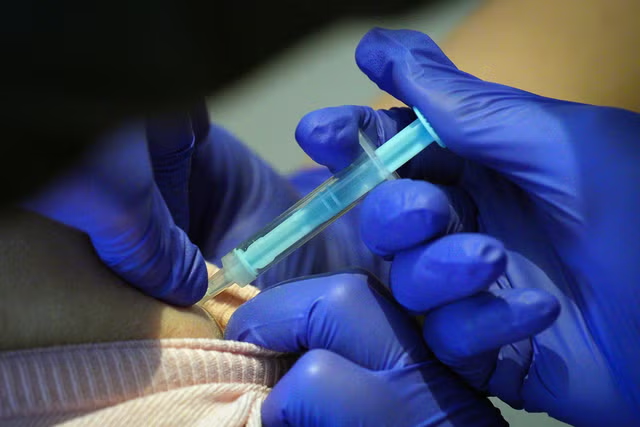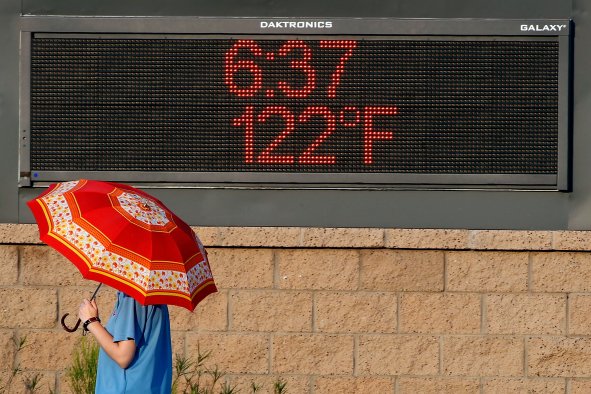It might sound like something from a romance novel, but it is possible to die from a broken heart. However, some people are much more vulnerable to this condition than others.
Newsweek spoke to cardiologist Sian Harding to find out the science behind this so-called Broken Heart Syndrome, and what you can do to protect yourself during times of loss.
"It's statistically proven that, if your spouse dies, you are more likely to die in that year, particularly close to the event," Harding, an Emeritus Professor of Cardiac Pharmacology at Imperial College London, told Newsweek. "I've studied this broken heart syndrome, and really there are two manifestations of this. And they both come down to adrenaline."
Adrenaline is the hormone responsible for priming our body's "flight or fight" response. It is released to prepare us for stressful or dangerous situations by triggering a range of physiological responses, including accelerated heart rate and high blood pressure.
"What happens when you have a bereavement is your adrenaline just shoots up very rapidly, and that can disturb the natural rhythm of your heart," Harding said. "The heart becomes overstimulated and begins beating really, really fast—so fast that it loses its rhythm. It loses its coordination. And so, some bits are beating one way, some are beating the other way. And the result of this is that you don't pump any blood out."
Without rapid defibrillation, this response can be deadly. And it's not unique to bereavement. "Things like sports can cause this too," Harding said. "You see it with athletes who drop dead on the pitch, and even people watching games."
However, aside from this general response to high levels of adrenaline, losing a loved one can also result in a sudden weakening of part of the heart muscle. This so-called Broken Heart Syndrome—also known as takotsubo cardiomyopathy—can often be confused for a heart attack. However, when you look closer, the condition is quite different.
"Broken Heart Syndrome mostly occurs in menopausal women and people often don't know they have it," Harding said. "Women—often those who are recently bereaved—come into hospital thinking they've had a heart attack.
"They have the symptoms of a heart attack, they have the chest pain, the electrical changes, the blood markers. But when their heart is imaged, they don't have any of the blood vessel blockages that would be expected with a heart attack. Instead, they have this very strange phenomenon where part of the heart is really beating very strongly, but the bottom part of the heart is almost paralyzed. And because you have to have reasonably sophisticated imaging to see this, very few people know they've ever had it."
Harding added that the condition is fairly rare, making up roughly 3 percent of those who come into hospital thinking they've had a heart attack. "There is mortality associated with it—about 5 percent of people will die because of this," she said. "But we've come to the conclusion that the condition paralyzes the heart to stop it having arrhythmias, so in some ways it's partially protective [against heart conditions with a higher mortality risk.]"
The condition doesn't only affect those who are recently bereaved, and may also result from severe fear, anger, surprise, or physical stresses like seizures.
So, what can you do to minimize your risk of developing this condition?
"The problem with something like bereavement is, of course, that it's really not something you can plan for," Harding said. "But you can at least be aware.
"With takotsubo, people will just feel ill, unwell, weak fatigue—but you might think it's just your body is just reacting to the fact that you've lost somebody. But it's important to be aware that during something like a bereavement, you should seek help if you experience these symptoms."
Those with underlying heart conditions will also be more vulnerable to takotsubo following stressful or upsetting events. "It can happen to healthy people, but if you've got something like high blood pressure or ischemic heart disease then you will be more susceptible," Harding said.
However, these heart conditions can often be invisible: "Around one in 250 people will have some sort of heart mutation, often that they don't know about until they got some extreme event like this," Harding said.
Even so, there are small lifestyle changes you can make to optimize your heart health and minimize your risk of developing this condition following the loss of a loved one, or similarly stressful events.
- Get active.
- Reduce stress—whether it's through work or home life, it's important to learn how to manage your stress levels so that you are equipped with all the tools you need when you are in a period of crisis. Continuous anxiety may also have a damaging effect on the heart.
- Eat healthily—reduce salt intake and eat a rainbow of fruits and vegetables.
- Talk to others—social interactions have been proven to be good for our overall health, and building a support group around you will help you through periods of grief or trauma.
Harding shares more about the intricate science of the heart in her book, The Exquisite Machine, and at the New Scientist Live event, taking place on Saturday, October 12, and Sunday, October 13, at ExCeL London, England. The event can also be streamed online.
Do you have a tip on a health story that Newsweek should be covering? Let us know via science@newsweek.com.
Disclaimer: The copyright of this article belongs to the original author. Reposting this article is solely for the purpose of information dissemination and does not constitute any investment advice. If there is any infringement, please contact us immediately. We will make corrections or deletions as necessary. Thank you.



